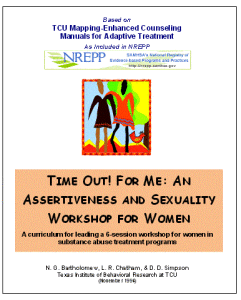
About this intervention
The Time Out! series consists of separate interventions for leading women-only and men-only workshops that address the sensitive topics of relationships, sexuality, and intimacy. Time Out! For Me provides substance abuse counselors or case workers with a curriculum for leading a 6-session workshop for women in their treatment programs. Issues addressed include sexuality, gender stereotypes, self-esteem, assertiveness skills, and reproductive health. The structured format for the workshop includes information sharing, discussion, exercises and activities, and role play. The intervention provides a comprehensive reference section on human sexuality, a resource directory, and handout materials for participants. Studies by the authors suggest that this intervention increases knowledge, self-esteem, and treatment tenure. The following topics comprise the workshop:
- A new outlook on sexuality
- My personal rights
- Getting through to people (communication skills)
- Woman-care, self-care
- Choices for today’s woman
- Talking about our sexuality
This intervention was developed as part of National Institute on Drug Abuse (NIDA) Grant DA06162, Improving Drug Abuse Treatment for AIDS-Risk Reduction (DATAR — Phase 1).
Recommended Citation: Bartholomew, N. G., Chatham, L. R., & Simpson, D. D. (1994).
Time Out! For Me: An assertiveness & sexuality workshop for women. Fort Worth: Texas Christian University, Institute of Behavioral Research.
Selected References
Studies have shown that participation in the Time Out! For Me workshop increases knowledge, self-esteem, communication skills, and treatment tenure for women. Women who attended 4 or more sessions stayed in treatment significantly longer following the workshop than those with poorer attendance.
Bartholomew, N. G., Chatham, L. R., & Simpson, D. D. (April, 2000). DATAR counseling manuals: An overview of structured interventions for improving treatment retention and participation. Poster presented at the American Methadone Treatment Association (AMTA) Conference, San Francisco.
Hiller, M. L., Rowan-Szal, G. A., Bartholomew, N. G., & Simpson, D. D. (1996). Effectiveness of a specialized women’s intervention in a residential treatment program. Substance Use and Misuse, 31(6), 771-783. [Abstract]
Bartholomew, N. G., Rowan-Szal, G. A., Chatham, L. R., & Simpson, D. D. (1994). Effectiveness of a specialized intervention for women in a methadone program. Journal of Psychoactive Drugs, 26(3), 249-255. [Abstract]
See also:
Simpson, D. D., Joe, G. W., Dansereau, D. F., & Chatham, L. R. (1997). Strategies for improving methadone treatment process and outcomes. Journal of Drug Issues, 27(2), 239-260. [Abstract]